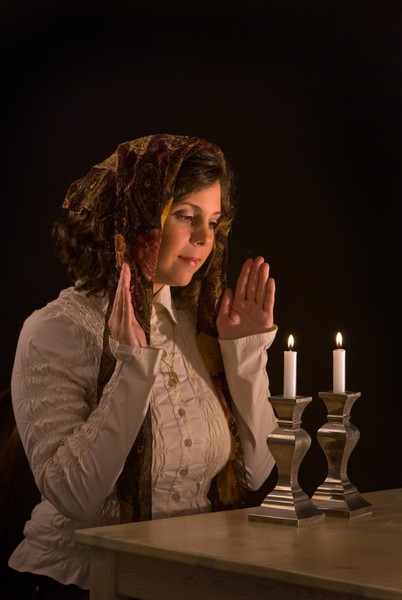Candle Lighting
We usher in the holy Sabbath day with light. And we escort the Sabbath out with light as well. Eighteen minutes before sunset on Friday each family lights together the holy Sabbath candles to welcome the Shabbat and its promise of peace and serenity within our hearts and our homes. Shabbat is the antidote to the frenetic insanity of modern life's disconnected families, over-scheduled calendars, addiction/slavery to technology, and the ennui and boredom of lives lived in boredom and endless drudgery, whether in the Poconos or anywhere else in the Jewish world outside of the Poconos.
In the Hebrew calendar the days of the week have no names, just numbers letting us know how many days until the next Shabbat arrives! The only two days which have names are "Friday" and "Saturday”, known as Erev Shabbat (Sabbath eve) and Shabbat, respectively. Completely foreign to the spirit of Judaism are the names of the days of the week in the secular calendar, which are all named after pagan gods. The pagan gods all fought each other and modeled lives of chaos and disorder, and were likewise disinterested in morality, justice, and human suffering.
The Jewish revolution introduced the world to a God Who is unique and desires unification with humanity and oneness between humanity. Moreover, He cares about morality and justice and the plight of the poor, the widow and the homeless and cares deeply for human freedom. This is epitomized in the story of the Exodus from Egypt. The Exodus symbolized God's Providence and involvement with human affairs, above and beyond Creation. While today actual miracles may not be as obvious and spectacular as in a Biblical epic, for those who are sensitive, His acts of salvation and love are constantly around us every day, if we but have the eyes to see. As Maggid Yitzchak Buxbaum once said, "there are no coincidences. Only providences."
The Sabbath is our Day of Rest. It is a day when we are liberated from the burden of creating, from the enslavement of technology and from the dissolution of human relationships engendered by atomized modern life and technology. We can communicate with strangers across the globe at our fingertips, yet we are barely able to talk face to face and heart to heart with those whom we love and share our pain and heartache.
Lastly, we escort the Sabbath out in all her royal splendor, as befitting a Queen. The Havdalah ceremony celebrates the difference between the holy and the unholy, between light and darkness, between the holiness of Shabbat and the other days of the week, and between the holiness of Israel and the rest of the nations. Holiness means set aside, separated, dedicated to God. Havdalah is made a full twenty five hours after kindling the Shabbat candles, when at least three stars are visible to the naked eye.
